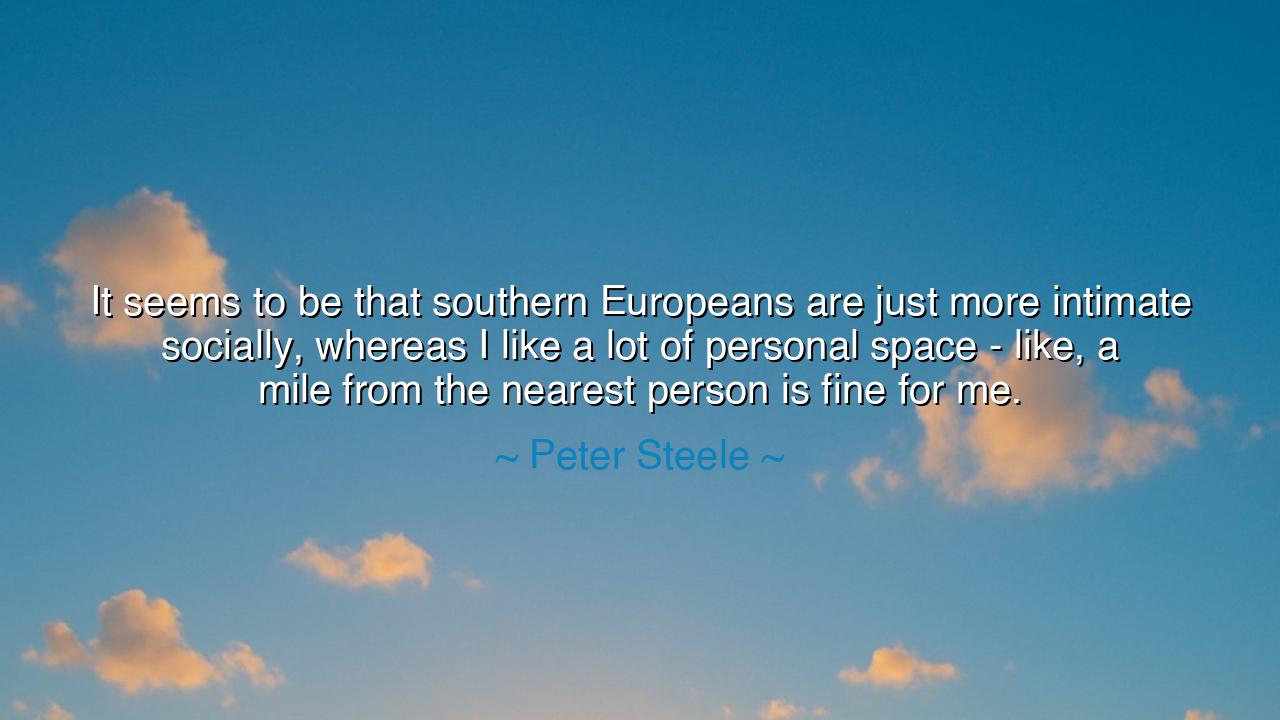
It seems to be that southern Europeans are just more intimate
It seems to be that southern Europeans are just more intimate socially, whereas I like a lot of personal space - like, a mile from the nearest person is fine for me.






Peter Steele, the towering poet of dark melodies, once spoke with a mixture of humor and truth: “It seems to be that southern Europeans are just more intimate socially, whereas I like a lot of personal space—like, a mile from the nearest person is fine for me.” Though offered in a lighthearted tone, his words carry a deeper reflection upon the eternal dance of human nature: the need for closeness and the longing for solitude, the tension between fellowship and the sanctuary of distance.
The meaning of this saying rests in the understanding that cultures shape the ways men draw near—or remain apart. In the warmth of Mediterranean lands, where sun and sea nurture open plazas, lively markets, and families gathered for long meals, people embrace closeness as a natural way of life. They touch, they speak loudly, they thrive in constant company. Yet for others, such as Steele himself, the spirit is nourished by personal space, by silence, by the freedom of distance. For him, solitude was not loneliness, but a kind of sanctuary—a vast breathing room where the soul could expand without intrusion.
The origin of this truth is as old as humanity’s diversity. Geography, climate, and history all shape the social patterns of nations. In the crowded cities of Rome or Athens, intimacy was woven into survival; in the wide forests and colder lands of the north, people learned to value separation and quiet. Peter Steele, born of northern blood and temperament, felt this contrast keenly. What others celebrated as warmth, he received as intrusion. What others feared as isolation, he embraced as liberation. Thus, his words reflect not only personal preference, but the deep inheritance of cultural patterns.
History offers many examples of this duality. Consider the Stoics of ancient Greece, who found strength in retreating inward, cultivating the fortress of the soul apart from the clamor of the crowd. Yet in contrast, the Romans thrived in forums and public spectacles, seeing intimacy not as weakness but as the foundation of civic life. Even great leaders carried this contrast: Marcus Aurelius, who longed for solitude even as he ruled an empire, and Julius Caesar, who lived for the roar of the multitude. Both were great men, yet their spirits sought different kinds of nourishment.
The deeper teaching here is that neither closeness nor distance is inherently superior. The intimate socially give warmth, connection, and the reminder that man is not alone but part of a living community. The seekers of personal space preserve reflection, individuality, and the inner stillness without which creativity and vision wither. Together, they form the balance of human society—one providing the fire of fellowship, the other the cool air of contemplation.
O children of tomorrow, learn this well: honor the needs of others, even when they differ from your own. Do not mock the one who craves company, nor despise the one who seeks distance. Understand that some hearts bloom in the crowd, while others bloom in the wilderness. Each soul must discover its proper measure of intimacy and solitude, lest it suffocate in closeness or shrivel in isolation.
Therefore, the lesson is clear: seek harmony between fellowship and solitude. If you are drawn to others, remember to grant them their space. If you love solitude, do not close yourself so tightly that love and friendship cannot enter. Let each man and woman know themselves and respect the ways of others, and in this mutual respect, society will flourish.
Thus Peter Steele’s words endure, not merely as jest, but as truth: some thrive in intimacy, others in personal space—and wisdom lies in knowing which you need, and allowing others the same freedom. Let this teaching remind you to embrace difference with understanding, and to walk the line between closeness and solitude with grace.






AAdministratorAdministrator
Welcome, honored guests. Please leave a comment, we will respond soon